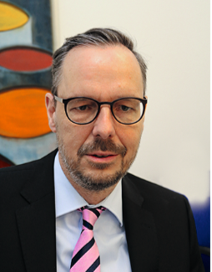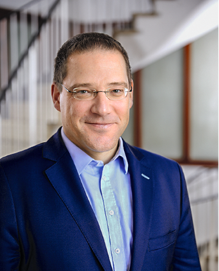On course for climate neutrality

Ralph Alberti, Executive Board Member of the German Chemical Trade Association (VCH):
“I BELIEVE THE CHEMICAL INDUSTRY IS DOING BETTER IN TERMS OF SUSTAINABILITY THAN THE PUBLIC TENDS TO RECOGNIZE.”
"I believe the chemical industry is doing better in terms of sustainability than the public tends to recognize. For example, VCH has been involved with the Responsible Care Initiative since 1996, collecting data on occupational safety and environmental protection issues. We’ve been looking at questions like: How many accidents are occurring? How much environmental damage is there? What are we doing about it? In the interest of continuous improvement, participating companies draw up action plans for three years at a time and have independent third parties come in to assess their goal achievement. Results show that the number of occupational accidents has fallen significantly over the past 25 years and that great progress has been made with regard to plant safety. As part of the European Solvent Recycler Group (ESRG), we are also driving forward the development of a circular economy: the carbon footprint of recycled solvents is now 50 to 90% lower than that of virgin products, and ESRG members are currently recycling 309,000 tons per year. As a result, they save 618,000 tons of CO2, which is equivalent to the emissions of 280,000 diesel cars. There is still room for improvement, however, as a lot of solvents are still being disposed of in waste-to-energy plants – and in some places, legislators formulate lofty sustainability goals without always creating suitable conditions."

Tanja Reilly, Senior Business Development Manager at EcoVadis:
“PURCHASING HAS A LOT OF LEVERAGE FOR DRIVING SUSTAINABILITY.”
"In terms of sustainability, the chemical industry is where others would like to be: far ahead of the game. There is still a lot to do, however – and when a company adopts a strategy like “We are going to be climate-neutral by 2030”, it obviously has to have a plan. Because 80% of carbon emissions currently come from the supply chain, data collection is essential in order to find out who the biggest CO2 emitters are in our supplier portfolio – and the best way to do that is to work together with others. Fortunately, our team at EcoVadis has had thirty-six chemical companies join forces in the Together for Sustainability initiative, giving us the chance to evaluate over 16,000 of their suppliers. Based on our findings, they have already seen a 70% improvement in the sustainability performance of their suppliers over the past few years. In my day-to-day work, I sit down with buyers to look at how we can integrate sustainability into the procurement process and decision-making. Purchasing has a great deal of leverage for driving sustainability in business relationships and, in turn, for being transformative. How a company positions itself now in terms of its purchasing activities will be crucial to its success in the years to come."

Felix Banaszak, Member of the German Parliament and of the Economic Affairs and Budget committees:
“WITH TARGETED GOVERNMENT FRAMEWORK CONDITIONS AND INVESTMENTS, WE CAN CREATE THE INFRASTRUCTURES OF THE FUTURE FOR THE CHEMICAL INDUSTRY.”
"With the goal of creating a climate-neutral industry, Germany has a great opportunity and a challenge to master: gaining an edge in international competition and securing its own climate-friendly prosperity in the long term. To work towards climate neutrality, German companies need to have the proper regulatory framework and the ability to plan ahead with certainty. The chemical industry in particular is one of the biggest energy-consumers and CO2-producers in the country, and it’s going to take long-term investment cycles to create change – especially since, in some cases, entire manufacturing plants will have to be converted. To support processes like these, we’ll also need a broad mix of initiatives: the accelerated expansion of renewable energies, for one, and with it the supply of green electricity and green hydrogen. Clear-cut carbon pricing, too. Using investment incentives such as contracts for difference, a carbon tariff like the Carbon Border Adjustment Mechanism and subsidies for sustainable investments, we want to make sure that our industry remains competitive. With these targeted governmental framework conditions in place and both public and private investments to support climate-friendly industrial policies, the chemical industry will be able to create the infrastructures of the future."

Elena Schad, Sustainability Officer with the German Chemical Industry Association (VCI):
“IF THE CHEMICAL INDUSTRY WANTS TO BE SUCCESSFUL IN THE FUTURE, TOO, WE HAVE TO FOLLOW THE GUIDING PRINCIPLE OF SUSTAINABILITY.”
"I think the industry understands now that sustainability – which is about fusing together economic success, social equity and ecological responsibility – must be at the heart of its strategy for the future. What can companies do to ensure sustainability? With the combined force of the German Chemical Industry Association (VCI), IG BCE trade union and Federation of Chemical Employers’ Associations (BAVC), the Chemie3 sustainability initiative provides chemical companies with support services – for example, a guide on establishing sustainable supply chain management. To make sustainability measurable, we have defined 40 indicators and we ask questions like: What about the company’s retirement provisions? How many vocational trainees are taken on? What is the gross value added and the global trade share? How much CO2 is emitted? We collect data like this and then issue reports. For the most part, what you can see right now is quite encouraging; greenhouse gas emissions have fallen, for instance, despite rising production rates. Achieving climate neutrality remains a distant goal, though, and a huge challenge that the industry is tackling with a combination of innovation and new technology. To be successful, however, it will also need to have supportive political framework."

Dr. Gerd Bergmann, Chairman of the Managing Board at Nordmann:
“AS A DISTRIBUTION COMPANY AND INTERMEDIARY, WE HELP ACHIEVE MORE SUSTAINABILITY IN OUR INDUSTRY NETWORK.”
"For Nordmann as a family-owned company, sustainable action has always meant being able to combine ecological, social and economic goals successfully. If we approach it correctly, sustainability will not become a cost factor but instead a way of investing in a future-proof company and environment.
Part of our strategy is to establish transparent value chains and treat the shouldering of social responsibility as a corporate success factor. As we move forward with sustainable development and energy management in accordance with ISO 50001, the Code of Conduct we have provides our staff members with guidance on legally compliant and responsible behavior. Since the beginning of the year, too, our company has had ISCC certification – contributing to an even more sustainable and transparent supply chain. Since products today can consist of many thousands of ingredients from all over the world, we want to ensure transparency. Our ultimate goal is to map the entire production cycle for our customers – from raw material extraction and production to utilization and recycling – and to make it clearly comprehensible.
As far as our product portfolio is concerned, we have already been marketing products from sustainable or renewable sources for some time now, particularly in the plastics and cosmetics sectors. This is also in response to a significant increase in demand for these types of products. We will continue to use our product and application knowledge to support customers in selecting raw materials and additives, provide advice on recycling and product shelf life, and do our part to promote greater sustainability as a distributor and intermediary in the industry network.
Let’s work together to build a bright and sustainable future."

Further information
For detailed product information please contact our experts: sales(at)nordmann.global


